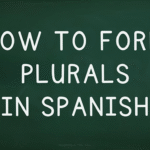Ser vs. Estar: The Ultimate Guide with Examples
🔙 Return to Spanish Irregular Verbs Main Hub
→ Want to practice first? Try the 3 level Ser vs. Estar Quiz!
Learning when to use “ser” and “estar” (both meaning “to be”) is one of the most important steps in mastering Spanish. These two verbs may seem similar, but using the wrong one can completely change your meaning—like saying “soy malo” (I am a bad person) instead of “estoy malo” (I feel sick)!
This fun and easy guide will teach you the key differences with 40+ clear examples, helpful tricks to remember the rules, and a 15-question quiz to test your skills. Perfect for students, teachers, and anyone learning Spanish!

📌 Ser vs. Estar: Quick Comparison Chart
| Use SER for: | Use ESTAR for: |
|---|---|
| Permanent traits | Temporary states |
| Identity (name, job) | Location/position |
| Time and dates | Current conditions |
| Origin/nationality | Emotions/feelings |
| Material/purpose | Progressive actions |
Key Difference:
- SER = Essential characteristics (who/what something is)
- ESTAR = Current status (how/where something is right now)
Special Cases: Weather, Time & Events
1. Weather Expressions
Rule: Use ESTAR for current weather conditions, SER for climate.
- Está lloviendo. (It’s raining right now.)
- Está nublado hoy. (It’s cloudy today.)
- El verano es caluroso en España. (Summers are hot in Spain.) (Permanent climate)
Exception:
- Hace frío/calor. (Uses “hacer,” not ser/estar)
2. Time vs. Date
Rule:
- SER for clock time (Son las tres)
- SER for days/dates (Hoy es lunes)
- ESTAR for events in progress (La clase está por empezar)
Examples:
- Es mediodía. (It’s noon.)
- ¿Qué día es hoy? (What day is today?)
- El concierto está a punto de comenzar. (The concert is about to start.)
3. Events vs. Locations
Rule:
- SER for event scheduling (La boda es en julio)
- ESTAR for physical location (El hotel está en la playa)
Contrast:
- El festival es en agosto. (The festival is in August.)
- El festival está en el centro. (The festival is downtown.)
4. Life/Death States
Rule:
- ESTAR for life status (Está vivo/muerto)
- SER for life milestones (Fue un gran actor)
Examples:
- Mi abuelo está muerto. (My grandfather is dead.)
- Era una persona feliz. (He was a happy person.)
5. Impersonal Expressions
Rule:
- SER for generalizations (Es importante estudiar)
- ESTAR for temporary opinions (Está claro que…)
Examples:
- Es necesario practicar. (It’s necessary to practice.)
- Está obvio que él miente. (It’s obvious he’s lying.) (Temporary context)
50 Essential Ser vs. Estar Examples
Permanent Traits (Ser)
- Soy Ana. – I am Ana. (Identity)
- Eres médico. – You are a doctor. (Profession)
- Es alto. – He is tall. (Physical trait)
- Somos de España. – We are from Spain. (Origin)
- La mesa es de madera. – The table is made of wood. (Material)
- Son las dos. – It’s two o’clock. (Time)
- Ella es mi hermana. – She is my sister. (Relationship)
- El concierto es en el parque. – The concert is in the park. (Event)
- Es un buen libro. – It’s a good book. (Essential quality)
- El invierno es frío. – Winter is cold. (Permanent trait)
Temporary States (Estar)
- Estoy en casa. – I’m at home. (Location)
- ¿Estás cansado? – Are you tired? (Condition)
- El café está caliente. – The coffee is hot. (Temperature)
- Estamos felices. – We’re happy. (Emotion)
- Está enfermo. – He’s sick. (Health)
- Están jugando. – They’re playing. (Progressive)
- El baño está sucio. – The bathroom is dirty. (Condition)
- La luz está encendida. – The light is on. (State)
- Estoy aprendiendo. – I’m learning. (Action)
- La tienda está cerrada. – The store is closed. (Status)
Same Word, Different Meanings
- Ella es aburrida. – She is boring. (Personality)
Ella está aburrida. – She is bored. (Current feeling) - Es listo. – He is smart. (Intelligence)
Está listo. – He is ready. (Preparation) - La manzana es verde. – The apple is green. (Color)
La manzana está verde. – The apple is unripe. (Condition)
Physical States & Locations
- La ventana está rota. – The window is broken.
- Tu camisa está manchada. – Your shirt is stained.
- El museo está cerca. – The museum is nearby.
- ¿Dónde está el baño? – Where is the bathroom?
- Las llaves están aquí. – The keys are here.
Emotions & Progressive
- Estoy emocionado. – I’m excited.
- ¿Estás enojado? – Are you angry?
- Están comiendo. – They’re eating.
- Estamos leyendo. – We’re reading.
Special Cases
- Está muerto. – He is dead. (Exception)
- La reunión es a las 5. – The meeting is at 5. (Time)
- La reunión está aquí. – The meeting is here. (Location)
Quiz Boosters
- ___ las cuatro. (Son)
- ___ un buen día. (Es)
- Las flores ___ frescas. (están)
- ¿___ tú el jefe? (Eres)
- Ellos ___ corriendo. (están)
Advanced Examples
- El niño es bueno. – The boy is good.
El niño está bueno. – The boy looks good. (Regional) - La puerta es abierta. – It’s an open-type door.
La puerta está abierta. – The door is open. - Soy callado. – I’m a quiet person.
Estoy callado. – I’m being quiet now. - El café es frío. ❌ (Incorrect)
El café está frío. ✅ – The coffee is cold. - Ella es rica. – She is rich.
Ella está rica. – She looks hot. (Slang)
Final Examples
- Estoy ocupado. – I’m busy.
- El agua está fría. – The water is cold.
- El examen es difícil. – The test is difficult.
- Estamos en el parque. – We’re at the park.
- ¿Estás listo? – Are you ready?
🧠 Ser vs. Estar Quiz
Ready to challenge yourself and finally conquer ser vs estar? Take the quiz HERE!



